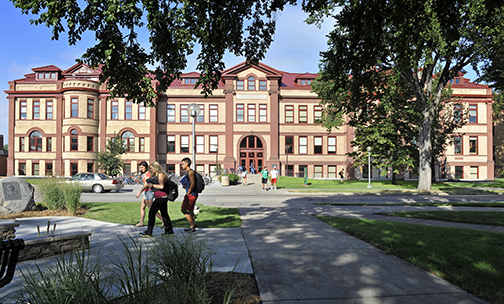
Sociology
This is an archived copy of the 2019-20 catalog. To access the most recent version of the catalog, please visit https://catalog.ndsu.edu.
Sociology is the study of human social interaction and social organizations. Sociologists study social change, diverse communities and their interactions, and use scientific methods to find empirical answers to complex social questions. Studying sociology fosters creativity, innovation, critical thinking, analytic problem solving, and communication skills. Sociology majors are employed in a variety of business, nonprofit, and government jobs.
The Program
Sociologists attempt to develop a better understanding of the way society works. They examine social relationships in institutions like the family, religion, the economy, health care, media, education and government. Sociology majors develop applied research and analytical skills and a perspective that prepares them to address social concerns. Courses are offered on campus and online. North Dakota State University offers graduate work leading to a master’s degree and frequently has students who pursue doctorates at other universities.
Faculty and Facilities
The faculty in the department provides expertise in specialties such as community, gerontology, gender issues, medical sociology, religion, research methods, social psychology, assessment and tribal studies. The department contains two social research laboratories.
Preparation
A basic background in the social sciences is important for a career in sociology. Students are encouraged to plan a curriculum that gives them a broad general education.
Career Opportunities
Sociological expertise can be useful in careers that involve community service, urban and regional planning, industrial development, population analysis, agricultural and rural life advocacy, economic or marketing studies, health-related work, government administration, human relations, human and social services, management or personnel, and research analysis.
Internship Program
Students in sociology may apply for the internship program. Students typically complete internships during their junior or senior year. Internship opportunities exist in many agencies in North Dakota and Minnesota and can be done any time during the calendar year. Students who complete internships are able to combine the theoretical and applied aspects of professional preparation. Our students have worked in a variety of settings including human and social services, volunteer agencies, community development, business and industry.
The Curriculum
Sociology students explore their interests within the program, including community development, gerontology, medical sociology, applied sociology, environmental sociology and gender issues, by taking classes in the areas of their choice.
Plan of Study
Please note this is a sample plan of study and not an official curriculum. Actual student schedules for each semester will vary depending on start year, education goals, applicable transfer credit, and course availability. Students are encouraged to work with their academic advisor on a regular basis to review degree progress and customize an individual plan of study.
| First Year | |||
|---|---|---|---|
| Fall | Credits | Spring | Credits |
| ANTH 111 | 3 | SOC 115 or 116 | 3 |
| SOC 110 | 3 | COMM 110 | 3 |
| ENGL 110 | 4 | ENGL 120 | 3 |
| Science/Technology | 3 | Humanities/Fine Arts | 3 |
| Wellness | 2 | MATH 104 | 3 |
| 15 | 15 | ||
| Second Year | |||
| Fall | Credits | Spring | Credits |
| SOC 214 | 3 | SOC 233 | 3 |
| STAT 330 | 3 | SOC 235 | 3 |
| AHSS Requirement | 3 | Science/Technology with lab | 4 |
| Science/Technology | 3 | Language/Minor | 3 |
| Language/Minor | 3 | Humanities/Fine Arts | 3 |
| 15 | 16 | ||
| Third Year | |||
| Fall | Credits | Spring | Credits |
| SOC 340 | 3 | SOC 422 | 3 |
| SOC 341 | 1 | Sociology electives | 6 |
| Upper Level Writing | 3 | Language or minor | 3 |
| Language or Minor | 3 | Internship or additional course | 3 |
| Sociology Elective | 3 | ||
| Global Perspective | 3 | ||
| 16 | 15 | ||
| Fourth Year | |||
| Fall | Credits | Spring | Credits |
| SOC 489 | 1 | Electives @ 300-400 level | 6 |
| Electives @ 300-400 level | 9 | AHSS requirement | 3 |
| Electives or minor | 3 | Elective or minor | 6 |
| 13 | 15 | ||
| Total Credits: 120 | |||
